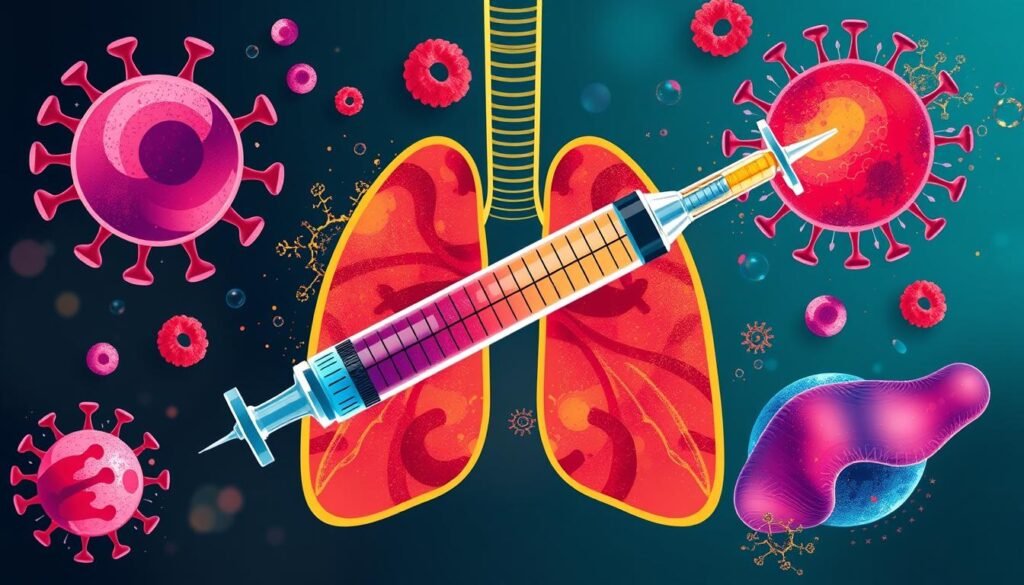Did you know about 1 in 15 men and 1 in 17 women might get diagnosed with lung cancer? This fact highlights the urgent need for new prevention methods. The idea of using a vaccine to stop lung cancer is now a key focus area. As medical science advances, the thought of cancer vaccines for both treating and preventing lung cancer is catching on. This piece looks into the possibility that vaccines could revolutionize lung cancer prevention. It examines current opinions and updates in vaccine research aimed at better patient outcomes.
Key Takeaways
- Approximately 1 in 15 men and 1 in 17 women may face a lung cancer diagnosis.
- The concept of a vaccine to prevent lung cancer is gaining ground in medical research.
- Innovative approaches like cancer vaccines could reshape lung cancer prevention strategies.
- Current medical advancements are focusing on enhancing patient outcomes through preventive measures.
- Research continues to explore the efficacy of vaccines in the fight against lung cancer.
Understanding Lung Cancer
Lung cancer is a major health issue, being a top cause of cancer deaths in the U.S. Learning about the types of lung cancer and risk factors is key. This knowledge helps with prevention and finding the right treatments.
Overview of Lung Cancer Types
There are mainly two types of lung cancer: non-small cell lung cancer (NSCLC) and small cell lung cancer (SCLC). Each kind has its own features, stages, and treatments. NSCLC makes up about 85% of cases and includes adenocarcinoma, squamous cell carcinoma, and large cell carcinoma.
SCLC is less common but spreads faster. It’s often found at a late stage.
Risk Factors for Lung Cancer
Many risk factors increase the chance of getting lung cancer. Smoking tobacco is the biggest risk. Even secondhand smoke can make non-smokers more likely to get lung cancer. Radon, asbestos, pollution, and genetics also play roles. Knowing these risks can help in taking steps to avoid the disease. This includes looking into vaccination strategies that might lower these risks.
The Role of Vaccines in Cancer Prevention
Vaccines are key in boosting the body’s defense against diseases, including cancer. They teach the immune system about antigens on cancer cells. This acts as a preventative step in fighting cancer.
The idea behind immunization is to train the immune system to recognize and fight diseases. It prepares the body to fend off infectious diseases and to spot and attack cancer.
How Vaccines Work in the Immune System
The immune system responds to vaccines in a special way. When vaccinated, the body is exposed to parts of pathogens or their imitations. This allows the immune system to build a defense as if it were actually being attacked.
For cancer, vaccines trigger immune cells to find and kill cancer cells. These cells might not be caught otherwise. This key interaction helps lower the risk of cancer by preventing tumors from growing.
Types of Vaccines and Their Applications
We have several vaccines that may help prevent cancer. They can be split into:
- Inactivated vaccines: These carry dead pathogens to prompt an immune reaction.
- Live-attenuated vaccines: These have weakened pathogens that cause strong immune responses.
- mRNA vaccines: This new method teaches cells to make certain proteins, leading to an immune response.
Each type of vaccine has its own way of targeting cancer. Scientists are looking into personalized cancer vaccines. These could be more effective because they’re customized for each person. Check out this link for more on cancer vaccines.

Vaccine to Prevent Lung Cancer?
Recent research shows a big promise in lung cancer vaccines for preventing the disease. Around 1.8 million people die from lung cancer every year. Scientists are now working hard to make vaccines that fight this deadly disease. They are testing various vaccines to see how well they work against lung cancer cells.
Current Research on Lung Cancer Vaccines
Scientists are looking into new lung cancer vaccines. These aim to use the body’s immune system to defeat cancer. Some studies show these vaccines make strong immune responses. They train the immune system to see and kill cancer cells. This is a new way to prevent lung cancer. Researchers are also studying how these vaccines can find and attack specific marks on lung cancer cells. This is key to their success.
Mechanisms of Action: Targeting Lung Cancer Cells
The way lung cancer vaccines work is by getting the immune system to fight off the cancer. This includes:
- Identifying cancer biomarkers: The vaccines target certain proteins on lung cancer cells.
- Activating T-cells: They make the immune system create T-cells. These T-cells then go after the cancer cells.
- Boosting immune memory: The vaccine builds immune memory. This helps the body fight cancer cells better if they come back.

The goal is to use lung cancer vaccines with other treatments. This could help patients live longer and better. For more information, you can check out this source.
| Vaccine Type | Purpose | Status |
|---|---|---|
| Preventive Vaccines | Aim to prevent lung cancer development | In development |
| Therapeutic Vaccines | Target existing lung cancer cells | In clinical trials |
| Combination Vaccines | Utilize multiple mechanisms to enhance immune response | Preclinical research |
Exploring Cancer Vaccines and Immunotherapy
In the world of cancer care, it’s vital to understand the difference between vaccines. Cancer vaccines serve distinct roles. Preventive vaccines stop cancer from developing by targeting risk factors. Therapeutic vaccines, on the other hand, treat cancers by boosting the immune system to fight tumors.
Differentiating Between Preventive and Therapeutic Vaccines
Preventive vaccines strengthen the body’s defense against factors that cause cancer. An example is the HPV vaccine. It prevents cervical cancer by fighting the human papillomavirus. Meanwhile, therapeutic vaccines help those already with cancer. They train the immune system to find and kill cancer cells, which can lead to better health outcomes.
Innovative Approaches in Immunotherapy
Breakthroughs in immunotherapy have improved both preventive and therapeutic vaccines. Techniques like checkpoint inhibitors and monoclonal antibodies boost the immune response. This makes the body more efficient at targeting and eliminating tumors. These advances highlight the crucial role of research in cancer vaccines and immunotherapy. To learn more about recent trends and hurdles, check out this insightful source.

Clinical Trials for Lung Cancer Vaccines
Clinical trials are crucial in cancer research, especially for lung cancer vaccines. They test new treatments for safety and effectiveness. The trials follow detailed rules to ensure results help us understand these therapies. By taking part, people help us see how treatments might change the disease and save lives.
Importance of Clinical Trials in Cancer Research
Cancer research gains a lot from clinical trials. Through these studies, scientists can:
- Determine the safety and side effects of new lung cancer vaccines.
- Find the best dosages for patient treatment.
- Evaluate new treatments compared to existing ones.
- See which patient groups might benefit the most from new vaccines.
In these studies, scientists learn how the immune system fights lung cancer vaccines. This info helps shape future cancer treatments.
Recent Findings from Ongoing Clinical Trials
Ongoing trials offer key findings on lung cancer vaccines. Many studies show promising results like better survival and improved life quality. Researchers also watch for side effects, making sure the benefits outweigh the risks.
Innovations like CIMAvax-EGF, researched by Roswell Park and Cuba’s CIM, may stop cancer growth factors. This work adds important knowledge to cancer research, showing how lung cancer vaccines might fight the disease.
| Study | Vaccine Type | Primary Findings |
|---|---|---|
| Study A | Immunotherapy | 30% increase in survival rates |
| Study B | Targeted Vaccine | Reduction in tumor size for 40% of patients |
| Study C | Dendritic Cell Vaccine | Positive immune response in 60% of participants |
Preventive Healthcare Strategies for Lung Cancer
Lowering lung cancer rates needs effective prevention strategies. These include both screening and health-enhancing lifestyle changes. Catching lung cancer early is crucial. It allows for quick action which can improve treatment results. By understanding and applying these strategies, we can better prevent lung cancer together.
The Importance of Early Detection
Finding lung cancer early greatly helps survival chances. Low-dose CT scans are great for spotting early lung cancer. If you smoke or have lung cancer in the family, get screened often. This early action lets doctors treat the cancer quickly, improving chances of beating it.
Complementary Measures for Lung Cancer Prevention
Besides early detection, we also need other steps for full lung cancer prevention. Changes in how we live are key. Here are some:
- Programs to help people stop smoking, the main cause of lung cancer.
- Exercising regularly to keep the body strong and healthy.
- Eating well, with lots of fruits, veggies, and grains, helps our body fight off disease.
- Staying away from harmful stuff like secondhand smoke and pollution at work.
When we include these actions in our health plan, everyone can help fight lung cancer. It’s about making smart choices for our health and future.
Oncology Research: Future of Cancer Vaccines
The future of oncology research is very promising. It focuses on creating cancer vaccines that work well. Researchers work on new treatments for different types of cancer. They want to make vaccines that can stop and treat cancer effectively.
Innovative Treatments on the Horizon
New treatments in oncology research are coming up. They focus on:
- Personalized Vaccines: These are made to match your tumor. They aim at the cancer cells in your body.
- Combination Therapies: This method combines cancer vaccines with other treatments. It makes everything more effective.
- Novel Adjuvants: Researchers are finding new ways to make your immune response stronger. This helps the cancer vaccines work better.
Collaboration in Cancer Research
Working together is key in making cancer vaccines faster. Drug companies, labs, and hospitals all chip in. Their goal is to:
- Share their knowledge and tools. This makes research go smoother.
- Pool their cancer study experts for better research studies.
- Help run clinical tests. They bring different people together for it.
| Treatment Type | Description | Current Status |
|---|---|---|
| Personalized Vaccines | Tailored to target individual tumor antigens. | In clinical trials |
| Combination Therapies | Utilizes multiple treatment modalities for enhanced efficacy. | Under research |
| Novel Adjuvants | New compounds to improve immune response to vaccines. | In development |
Cancer research is making huge strides. With new treatments and teamwork, we’re closer to stopping cancer. Everyone involved brings us hope for finding successful cancer vaccines soon.
Understanding Anti-Tumor Immunity
Anti-tumor immunity is key in fighting cancer cells. It’s about the immune system spotting and attacking abnormal cells. T-cells and antibodies play a big role in this defense.
How Anti-Tumor Immunity Works
The immune system sees tumor cells as invaders because of antigens on their surface. T-cells get activated and destroy these harmful cells. This skill to tell apart normal and cancer cells helps in cancer prevention.
The Role of Immune Response in Cancer Prevention
Vaccines boost the immune response against cancer. They teach the immune system to recognize cancer cells. This helps stop cancer growth and lowers the chance of it coming back.
Vaccines have been found to raise survival rates in cancer patients. Research into cancer vaccines offers hope in the fight against cancer. For more on vaccine research, visit this article.
Conclusion
The search for a lung cancer vaccine shows the exciting link between immunotherapy and cancer prevention. This area of study shines a light on new ways to use the immune system against lung cancer. Scientists keep exploring different vaccine methods, making it more hopeful to include them in usual treatment plans.
It’s vital to keep pushing forward with research in this area. Knowing more about how our immune system fights cancer can lead to big discoveries. These advances help improve cancer prevention. A combined effort that includes finding cancer early, living healthier, and creating effective vaccines makes defeating lung cancer seem possible.
We encourage everyone to stay up-to-date with immunotherapy and vaccine research. Knowing the latest findings and how to prevent illness helps people make smart choices for their health. This knowledge is a powerful tool in battling lung cancer.